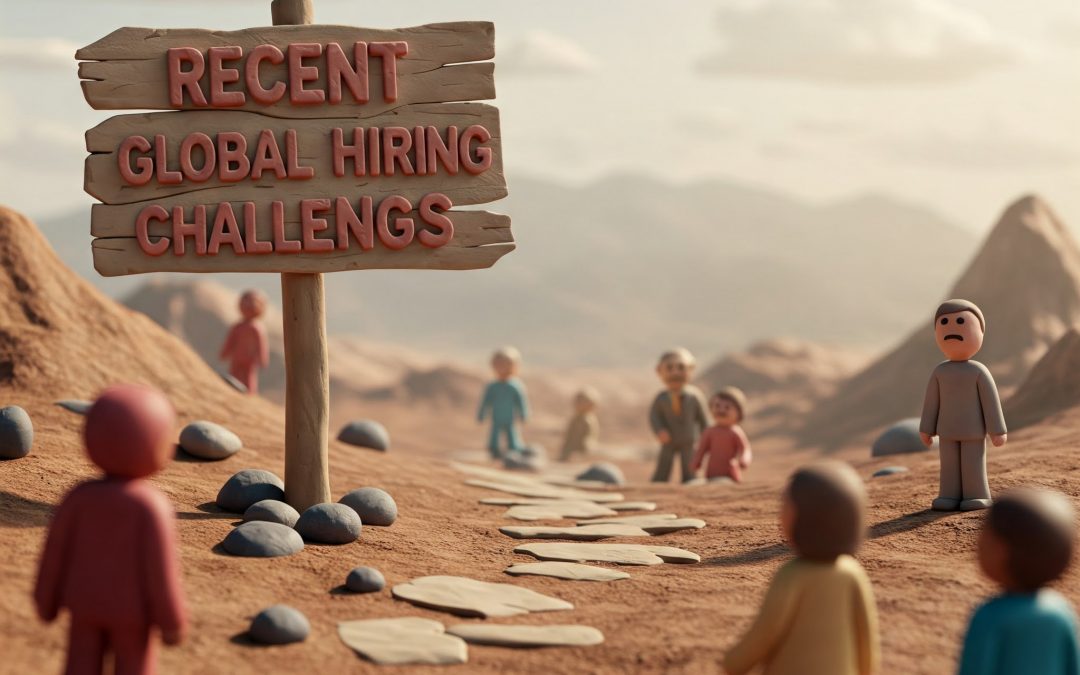Key Points
- Research suggests global hiring faces challenges like talent shortages, skill gaps, and high turnover, with AI and automation adding complexity.
- It seems likely that economic uncertainties and remote work issues are also significant, with green skills and DEI efforts needing more focus.
- The evidence leans toward companies needing to adapt with upskilling, cultural intelligence, and compliance strategies to address these issues.
Rapid Job Market Changes
The job market is evolving quickly, with up to 23% of jobs expected to change in the next five years due to tech and economic shifts. This means companies must adapt to new roles and skills, which can be challenging.
Talent and Skill Challenges
There’s a global talent shortage, potentially reaching 85.2 million people by 2030, especially in tech and green jobs. Skill gaps are a big barrier, with 63% of employers noting a mismatch, requiring significant upskilling efforts.
Employee Retention and Engagement
High turnover is costly, with replacement costs up to 3-4 times an employee’s salary. Disengaged employees also hurt morale, pushing companies to focus on career growth and recognition to keep talent.
Global and Remote Work Issues
Hiring globally means dealing with diverse labor laws and managing remote teams, which can be tricky. Remote work needs clear structures and tools to maintain productivity and culture, especially with hybrid models growing.
Emerging Trends
AI and automation are creating jobs but also displacing some, like clerical roles, while green skills are in demand. DEI efforts are slow, and economic uncertainties can lead to hiring freezes, adding to the complexity.
Survey Note: Detailed Analysis of Recent Global Hiring Problems in 2025
As of April 2025, the global hiring landscape is navigating a complex array of challenges driven by technological advancements, economic shifts, and evolving workforce expectations. This analysis, informed by recent reports and industry insights, provides a comprehensive overview of the key hiring problems affecting organizations worldwide, with a focus on their implications and potential strategies for recruitment consultants like Zoorbi.
Transformative Trends and Job Market Evolution
The job market is undergoing rapid transformation, with the Future of Jobs Report 2025 suggesting that up to 23% of jobs are expected to change in the next five years. This evolution is driven by macrotrends such as broadening digital access (60% of employers expect transformation by 2030), increasing cost of living (50%), climate-change mitigation (47%), demographic shifts, and geoeconomic fragmentation (34% expect business model transformation). These changes necessitate agile recruitment strategies to adapt to new roles, particularly in technology and green sectors, while clerical jobs like Cashiers and Administrative Assistants are declining, with an expected displacement of 8% of current jobs (92 million jobs).
Talent Shortages and Skill Gaps
A significant challenge is the global talent shortage, with estimates from The Talent Games suggesting a potential deficit of up to 85.2 million people by 2030. This shortage is particularly acute in technical fields like software development, AI, and green energy, as well as frontline and care economy roles. Compounding this, skill gaps are identified as the biggest barrier to business transformation, with 63% of employers in the Future of Jobs Report 2025 noting them as a major issue. By 2030, 59 out of 100 workers are expected to need significant upskilling, with 39% of existing skill sets projected to become outdated or transformed. Top in-demand skills include analytical thinking (70% essential), AI, big data, and technological literacy, while manual dexterity and endurance are declining (24% foresee decrease).
| Category | Details | Impact |
|---|---|---|
| Talent Shortage | Up to 85.2 million by 2030, affecting tech, green, and care sectors | Delays projects, increases competition for talent |
| Skill Gaps | 63% employers see as barrier, 59/100 workers need upskilling by 2030 | Hinders business transformation, slows hiring |
Impact of Automation and AI
Automation and AI are dual-edged swords, creating new opportunities while displacing traditional roles. The Future of Jobs Report 2025 notes that AI is expected to be adopted by nearly 75% of companies, with 66% planning to hire staff with AI skills and 40% anticipating workforce reductions where AI automates tasks. This shift is leading to high churn, with 50% of organizations expecting job growth and 25% expecting job losses. The challenge lies in balancing these changes, particularly for roles like Data Entry Clerks and Bank Tellers, which are among the fastest-declining.
Employee Retention and Engagement Challenges
High turnover remains a pressing issue, with Rippling’s 2025 HR Challenges estimating replacement costs at 33% to 6-9 months of an employee’s salary, or even 3-4 times in some cases. Retention is hindered by factors such as lack of career growth, poor work-life balance, and inadequate recognition, with disengaged employees underperforming and dampening morale. Strategies to address this include competitive compensation, tailored career development paths, rewards programs, and fostering inclusive cultures, as highlighted in the report.
| Challenge | Cost Impact | Strategies |
|---|---|---|
| Employee Turnover | 33%-6-9 months salary, up to 3-4x salary | Competitive benefits, career paths, recognition |
| Employee Engagement | Impacts morale, productivity | Transparency, leadership development, tech support |
Global Hiring Complexities and Remote Workforce Management
Expanding hiring globally introduces complexities, as noted in Forbes’ Winning Strategies for Global Hiring in 2025. Companies must navigate diverse labor laws, cultural differences, and compliance requirements, with 77% of Gen-Z employees valuing diversity commitment (Microsoft Work Trend Index Annual Report). Remote workforce management is another hurdle, requiring clear structures, the right tools, and consistent communication, with a U.S. Bureau of Labor study showing productivity increases with effective remote work practices. However, managing hybrid models and maintaining company culture remains challenging.
Sustainability and Green Skills Demand
The demand for green skills is outpacing overall hiring trends, with the Future of Jobs Report 2025 noting that green hiring consistently outperforms labor-market trends. Roles like Renewable Energy Engineers and Environmental Engineers are growing, but there’s a shortage of workers with these skills, requiring targeted recruitment and training efforts.
Economic Uncertainties and Hiring Freezes
Economic fluctuations, including inflation and recession fears, are leading to hiring freezes, as noted in SHRM’s 2025 survey. This cautious approach prolongs hiring processes, particularly for mid-level and entry-level positions, and reduces job opportunities, impacting both employers and candidates.
Diversity, Equity, and Inclusion (DEI) Issues
Progress in DEI initiatives has been slow, with only a 2% increase in workplace racial and ethnic diversity over the past five years, according to McKinsey’s studies. Challenges include integrating diverse talent and ensuring inclusive hiring practices, with 83% of employers in the Future of Jobs Report 2025 prioritizing DEI, up from 67% in 2023. This slow progress can deter top candidates and reduce team cohesion.
Performance Management, Mental Health, and HR Automation
Outdated performance management systems disconnect employees from goals, requiring continuous feedback and software solutions, as per Rippling’s 2025 HR Challenges. Mental health and well-being are critical, with burnout affecting retention and engagement, necessitating supportive cultures and wellness programs. Additionally, 45% of HR leaders spend over 50% of their time on admin work, limiting strategic focus, and requiring automation and integrated HR software for data management.
Hiring Process Inefficiencies and Conflict Resolution
Hiring process inefficiencies, such as standalone ATS and lack of integrated data, lead to repetitive data entry and inconsistent candidate experiences, as noted in Rippling’s 2025 HR Challenges. Conflicts in the workplace, whether employee-employee or employee-manager, can increase turnover and create toxic environments, requiring open communication and HR mediation.
Increased Competition and Cultural Intelligence
The competition for talent is intensifying, with more companies building international workforces, as per Forbes’ Winning Strategies for Global Hiring in 2025. Cultural intelligence is essential, with 77% of Gen-Z employees valuing diversity commitment, pushing companies to develop inclusive workplaces and comply with global labor laws.
This detailed analysis underscores the multifaceted nature of global hiring problems in 2025, highlighting the need for recruitment consultants to adopt innovative strategies, invest in upskilling, and prioritize cultural fit and employee well-being to navigate this evolving landscape effectively.
Key Citations
- Future of Jobs Report 2025 World Economic Forum
- 10 HR Challenges in 2025 Rippling
- Winning Strategies For Global Hiring In 2025 Forbes
- Microsoft Work Trend Index Annual Report
- U.S. Bureau of Labor Remote Work Productivity Study
- Global Talent Shortage 2025 The Talent Games
- SHRM Hiring Outlook 2025 Survey

